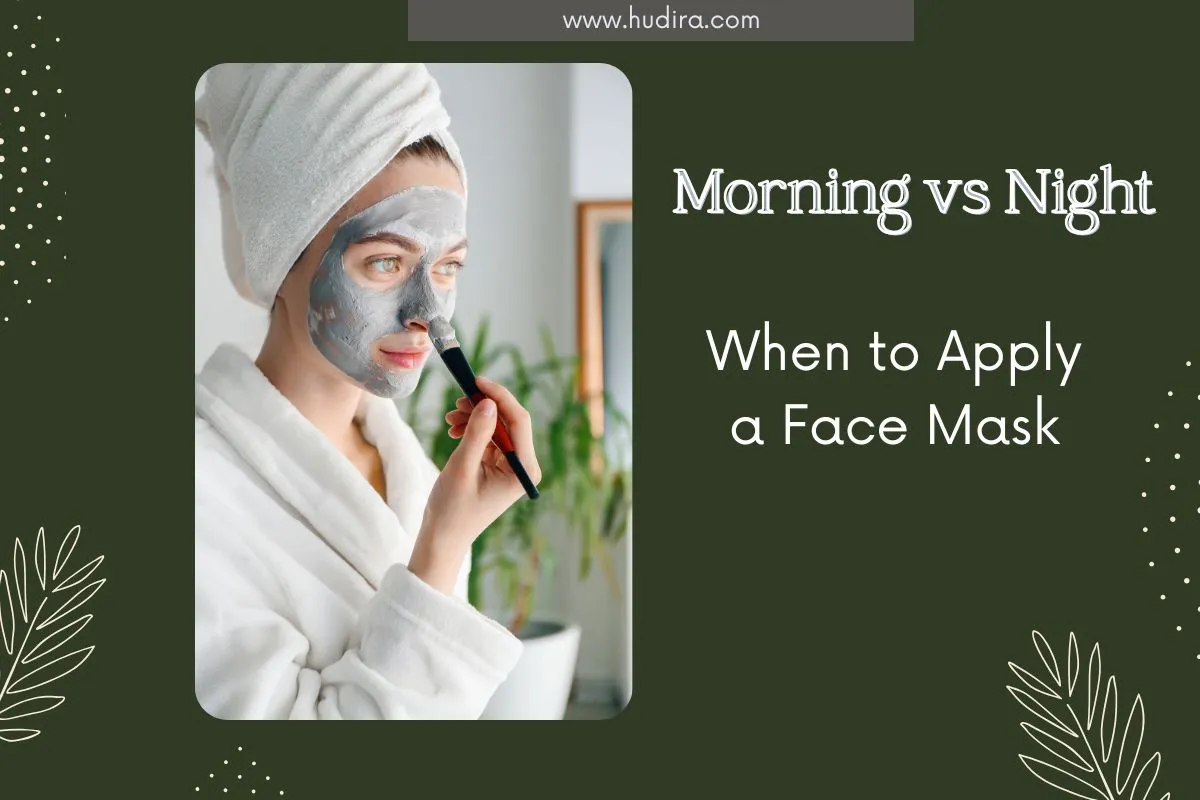No products in the cart.

When to apply a face mask is a question that’s been whispered in beauty circles and debated in skincare forums. Should it be part of your fresh morning ritual, or is it better reserved for the stillness of night? As beauty routines grow more personalized, knowing the best time to use facial mask can be the key to unlocking radiant, healthy skin.
Imagine waking up to a glowing face after a restful night or prepping your skin for a productive day ahead. Both options have merit, but understanding your skin’s natural rhythms and your product’s ingredients will determine when to use a face mask morning or night—for maximum results. Ready to discover the perfect time to pamper your face? Let’s decode the skincare secret that many overlook but that your skin will thank you for.
Why Timing Matters in Skincare
Knowing when to apply a face mask can dramatically influence its effectiveness. Just like your body follows a circadian rhythm, so does your skin. During the day, your skin works as a barrier to protect against pollution, UV rays, and environmental stress. At night, it shifts to repair mode, allowing restorative ingredients to penetrate deeply.
Understanding this rhythm helps determine whether the best time to use a facial mask is in the morning or night. Certain face masks work better when your skin is alert and absorbing hydration quickly, while others function best when your skin is calm and ready to rejuvenate.
Face Mask in the Morning: A Glowing Start
Using a face mask in the morning can prep your skin for the day ahead and set a positive tone for the rest of your routine. Morning masks are especially effective when you need a quick boost—hydration, radiance, and smoothness before facing environmental stressors like pollution, UV rays, and makeup. It’s the ideal time to wake your skin up and provide it with the nourishment it needs to stay resilient all day.
Energizing ingredients such as Vitamin C brighten your skin and combat dullness. Green tea helps soothe and protect the skin from oxidative stress, while hyaluronic acid plumps and deeply hydrates for that dewy glow. If you use makeup, apply a face mask in the morning can enhance its longevity and finish, as smoother, hydrated skin helps your foundation sit flawlessly.
Benefits of Morning Masks
- Refresh and awaken tired skin
- Provide instant hydration
- Tighten pores for smoother makeup application
- Shield skin with antioxidants
- Create a fresh, luminous base for SPF or cosmetics
Ideal Morning Mask Types
- Gel masks: Lightweight and cooling, perfect for puffy or oily skin
- Sheet masks with cooling agents: Great for hydration and toning
- Vitamin-rich creams: Nourish and energize without leaving residue
Use these before your toner or serum to give your skin a power-packed start. So, if you’re wondering when to use a face mask in skin care routine, the morning can be perfect for revitalizing masks that energize and brighten.
Night Face Mask Routine: Repair and Restore
Nighttime is when your skin naturally repairs itself, which makes it an ideal time for deep nourishment. While you sleep, your skin’s permeability increases, allowing active ingredients in face masks to penetrate deeper and work more effectively. This regeneration phase is when the skin restores damage from daily exposure to UV rays, pollution, and oxidative stress.
Applying a face mask at night supports this natural renewal process. Ingredients that may be too potent for daytime use—like retinol or exfoliating acids—are especially effective at night, when the skin is not exposed to sunlight and has uninterrupted hours to absorb nutrients.
Benefits of Night Masks
- Accelerates skin regeneration by boosting collagen production and cell turnover
- Deeply moisturizes and soothes dry or irritated skin, replenishing overnight
- Fights fine lines and signs of aging through enhanced absorption of anti-aging ingredients
- Allows herbal active ingredients like neem, saffron, and tulsi to work undisturbed, improving skin texture, tone, and overall clarity
Ideal Night Mask Types
- Sleeping masks: Infused with calming botanicals such as aloe vera and lavender; designed to be left on overnight to soothe and nourish the skin
- Cream-based or overnight masks: Enriched with natural emollients like honey, sandalwood, and rose to provide intense hydration and lock in moisture throughout the night
- Masks with turmeric, saffron, or chamomile: Help restore the skin barrier, reduce redness, brighten the complexion, and promote even skin tone using only plant-powered ingredients
The best time to use facial mask treatments like anti-aging, brightening, or clarifying masks is at night. This is especially true for products containing ingredients that are light-sensitive or work best in a calm, resting environment—maximizing your skin’s natural repair cycle while you sleep.
Morning vs Night: A Side-by-Side Comparison
| Feature | Morning Mask | Night Mask |
| Purpose | Hydration & prep | Repair & renewal |
| Ideal Ingredients | Aloe vera, rose water, turmeric | Neem, tulsi, saffron |
| Suitable For | All skin types, especially oily or dull | Dry, mature, sensitive skin |
| Benefits | Radiance, smoother makeup base, even skin tone | Deep hydration, calms irritation, supports cell renewal |
| Application Time | 10–15 minutes before herbal toner or serum | 15–30 minutes before bed or leave on overnight |
So, when to use a face mask—morning or night—depends on your skin goals and your choice of natural, herbal ingredients. Use this guide as your personalized skincare compass rooted in the power of botanical care.
Best Time to use Facial Mask by Skin Type
Oily Skin: Morning masks formulated with salicylic acid or activated charcoal are excellent for absorbing excess sebum, unclogging pores, and preventing midday shine. Using these masks at the start of your day helps manage oil production, minimizes breakouts, and keeps your skin feeling fresh and matte throughout the day.
Dry Skin: For dry skin types, nighttime is the optimal window to deeply replenish lost moisture. Masks containing ceramides help rebuild the skin barrier, while honey draws moisture into the skin and provides anti-inflammatory benefits. These ingredients work best while you sleep, giving your skin uninterrupted time to soak in hydration and repair dry, flaky patches.
Combination Skin: This skin type benefits most from a balanced approach. In the morning, use lightweight, hydrating masks with ingredients like aloe vera or hyaluronic acid to maintain freshness without overwhelming oily zones. At night, switch to rich, nourishing masks targeted at drier areas to restore balance and strengthen the skin’s natural barrier.
Sensitive Skin: Nighttime is ideal for sensitive skin to receive gentle care without external triggers like sunlight or pollution. Masks with calming agents like aloe vera, calendula, chamomile, or oat extract help reduce redness, soothe irritation, and strengthen the skin’s tolerance. Always choose fragrance-free and hypoallergenic formulas to avoid flare-ups.
Expert Tips to Maximize Results

1. Cleanse First
Always start with a clean canvas. Washing your face removes makeup, dirt, oil, and environmental pollutants that can block your skin from absorbing the mask’s ingredients. A thorough cleanse ensures the mask can penetrate deeply and deliver its full benefits.
2. Use Lukewarm Water
Hot water can strip the skin of its natural oils and cause irritation, while cold water can close the pores too soon. Lukewarm water is ideal as it gently opens the pores, allowing the active ingredients in your mask to work more effectively without damaging your skin.
3. Follow with Toner & Serum
After rinsing off the mask, your skin is at its most absorbent. Applying a toner helps restore the skin’s pH balance and remove any residual product. Following up with a serum locks in the herbal actives from the mask and enhances hydration or treatment effects, depending on your skincare goals.
4. Don’t Overuse
While herbal face masks are a natural treat, using them too frequently can overwhelm your skin, especially if they contain strong botanicals like neem or clove. Most skin types benefit from using a mask 2–3 times a week, unless the product specifies otherwise. Listen to your skin—natural doesn’t always mean more is better.
5. Patch Test
Particularly important when trying a new herbal mask or one that contains potent plant actives (like turmeric, cinnamon, or essential oils). Apply a small amount to a discrete area (like behind your ear or on your inner arm) and wait 24 hours. This precaution helps prevent unexpected allergic reactions or irritation on your face.
Hudira’s Herbal Face Masks: Tailored for Every Routine
At Hudira, we believe that when you apply your skincare matters just as much as what you apply. That’s why our herbal face masks are formulated with the purest natural ingredients—turmeric for brightening, neem for purifying, saffron for radiance, and rose for hydration—each thoughtfully blended to work in sync with your skin’s circadian rhythm. Our products are halal-certified, cruelty-free, and designed to complement the skin’s needs during different times of the day.
- Use an Orange Glow Face Mask in the morning to awaken dull, tired skin. Infused with citrus extracts, turmeric, and rose, this mask delivers a natural glow, shrinks pores, and hydrates your skin to prepare it for sunscreen or makeup. It’s perfect for energizing your complexion and adding brightness to your morning routine.
- Try the Anti-Acne Face Mask at night when your skin is in its healing phase. Enriched with neem, tulsi, and tea tree oil, this mask targets inflammation, unclogs pores, and soothes irritated areas. Using it at night allows the active botanicals to work without interference from environmental stressors, giving your skin a chance to reset and repair.
- Apply the Brightening Face Mask before bed for overnight illumination. Featuring saffron, sandalwood, and aloe vera, this mask nourishes, evens out skin tone, and promotes a golden glow by morning. Best used after cleansing and toning, it supports overnight regeneration and enhances your skin’s clarity.
No matter your skin type or lifestyle, Hudira’s masks offer a botanical-based ritual that supports your skin’s natural beauty. Explore our complete range at Hudira.com and experience the gentle power of herbal skincare tailored for every moment of the day.
Call-to-Action
Still wondering when to apply a face mask for your skin? Morning or night, Hudira’s natural face masks have you covered. Try them today and feel the glow every hour of the day!
FAQs
Q. Can I use a face mask both in the morning and at night?
Yes, but not on the same day unless specified by the product. Alternate use is recommended.
Q. What’s the best face mask in the morning for oily skin?
A clay or salicylic acid mask to control sebum production.
Q. Is it okay to sleep with a face mask on?
Only if it’s a sleeping mask designed for overnight use.
Q. Should I moisturize after a face mask?
Absolutely! It seals in the benefits and keeps your skin hydrated.
Q. How long should I leave a face mask on?
Usually 10–20 minutes unless otherwise specified on the product.



Add comment